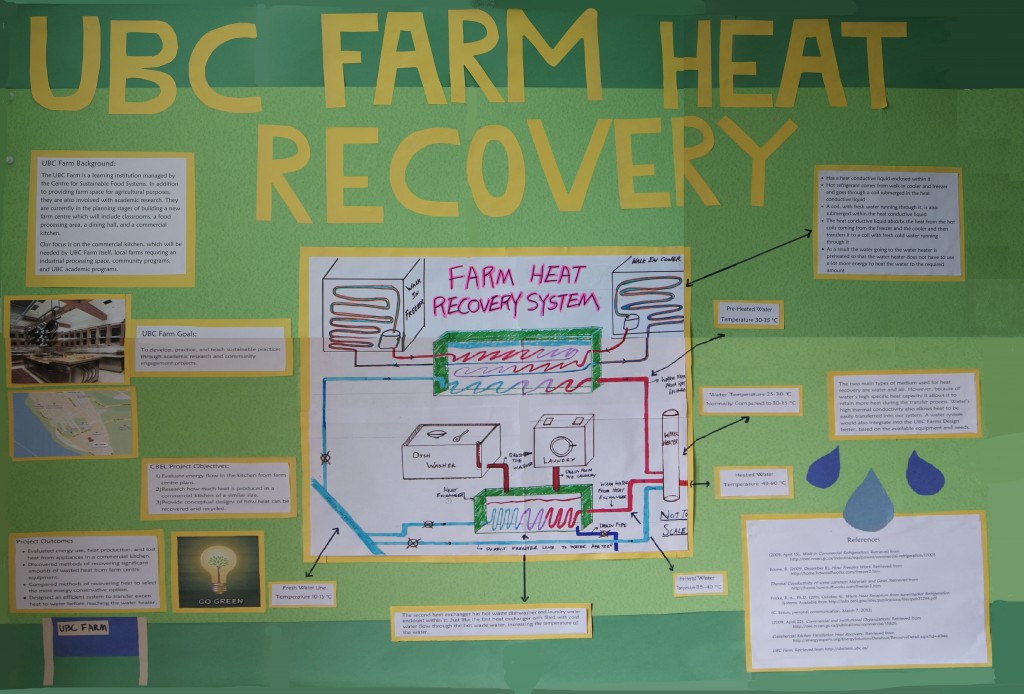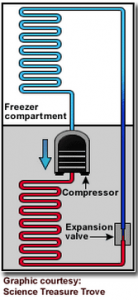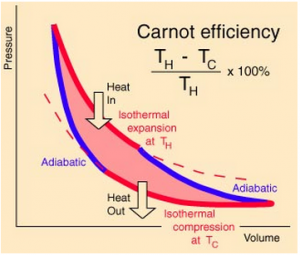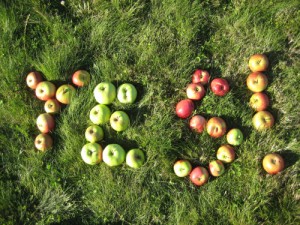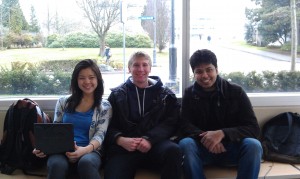Project Implementation
We are on the final stages of completing our report for the UBC Farm centre. Certain aspects of our research have proven to be difficult to complete. More specifically, our evaluation of energy flow and heat production in a kitchen could not be accurately quantified. Because the Farm’s commercial kitchen is still in the early planning stages, we have been required to make assumptions, resulting in less precise research than we initially planned. Nonetheless, we were able to complete these tasks by modifying our plan: rather than using specific numbers that may be inaccurate, we chose to compare various appliances in relation to each other. In this way, we have been still able to use this research to justify our heat recovery designs. Our conceptual designs have been finalized; to ensure our designs are feasible, we have received external input from an expert in heating and refrigeration systems.
Final Design Summary:
Our primary goal was to create conceptual designs to recover heat from the future farm centre’s commercial kitchen. As steps to complete this design, we studied appliances that will be used in the farm centre to determine the best sources of recoverable heat and the most effective uses of the recycled heat.
Water was selected to receive the recycled heat; it will absorb heat more efficiently than air and it will be used year-round. The walk in freezer, cooler, dishwasher and laundry machine produce significant amounts of recoverable heat. As shown in the sketch below, the components of these appliances that emit heat will be contained in an insulated container full of highly heat conductive fluid. Pipes carrying fresh water to the water heater will also pass through this container to be preheated before reaching the water heater. This will reduce the amount of energy required by the water heater to raise the temperature of the water.
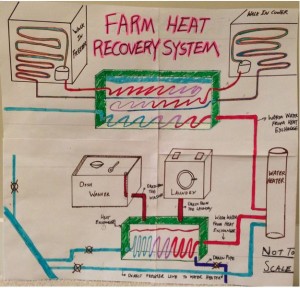
Heat Recovery Design Sketch (higher temperature is indicated by the colour red, lower temperature is indicated by the colour blue)
Project Outcomes
Next week, we will be submitting a report to our client with the following contents:
- Energy Flow in the Kitchen
- Heat Recovery Designs
- Recovered Heat Implementation
- Case Studies of Heat Production/Use in Similar Situations
- Final Recommendations for the new UBC Farm Centre
Project Implementation Plan
At this stage of the project, we are analyzing the information we received from the client. We are now exploring different ideas to come up with the best solution for the clients needs. We are going to discuss our project with an expert in thermodynamics.
This is being completed by creating an agenda for the whole group, by splitting up the work between our members.
Agenda:
March 8
- Completed: Blog Post
- Completed: Drafts of each section
- Team meeting to compile sections and begin finalizing and proofreading the report
March 15
- Completed: Report
March 15-22
- Team meeting to complete poster
March 25
- Completed: Poster
Main Report Sections:
Purpose and Scope (Vivian)
Abstract (Josh)
Background of UBC Farm Centre (Josh)
Energy Use of Kitchen (Steven)
- Diagram of Energy Flow (Steven)
Heat Flow (Steph)
Heat Recovery Recommendations
- Fridge/Freezer (Steph)
- Dishwasher (Vivian)
Recovered Heat Implementation (Amit)
Case Studies (Steven)
Final Recommendations (Everyone)
Reflections (Everyone)
As part of our investigation into which appliances gave off the most heat, we visited a commercial kitchen located in the basement of the SUB on the UBC Campus. The walk- in freezers, walk-in coolers, dishwashers and dryers were found to give off sufficient heat to warrant heat recovery. We are planning on transferring the heat to the water system.
Progress Update!
Project Background and Goals
The UBC Farm is a learning institution managed by the Centre for Sustainable Food Systems. They are currently in the planning stage of building a new farm centre which will include classrooms, a food processing area, a dining hall, and a commercial kitchen. Our focus is on the commercial kitchen, which will be used by local farmers, community members, and Food & Nutrition LFS students. The kitchen will meet food safe standards. This, in combination with the demand for local food, will ensure that the kitchen will experience a lot of use; it is expected to be used six days out of the week or roughly 75 hours per week.

UBC Farm (Source: http://ubcfarm.ubc.ca/about/farm-features/)
Their building is still in the design stages; our CIVL 202 CBEL group has been asked to contribute conceptual designs for a heat recovery system for their commercial kitchen. The UBC Farm has a focus on sustainability and as a result they are exploring energy efficient options. During our meeting with Veronik Campbell, the Academic Coordinator for the UBC Farm, she provided us with a preliminary proposed layout of the building. We are to evaluate energy flow in and out of the kitchen, study how much heat is produced by similar commercial kitchens, and provide designs of how the energy could be recycled.
Next Steps
While reviewing some farm centre plans, we determined that the primary appliances that produce significant amounts of heat are two walk in coolers and one commercial size stove. However, we will study other appliances in more depth once we receive an extended equipment list from Ms. Campbell. Furthermore, we are going to research other equipment that will produce large amounts of heat by looking into pre-existing commercial kitchens.
We are currently at the brainstorming stage of our design; we are exploring methods of capturing and transferring heat, and ways of using the heat. Some possible ways of using this recycled heat is to transfer it to water, classroom space and greenhouses. Our client is also interested in directing heat to outdoor classrooms but our initial response is there are more efficient uses for the recycled heat. As a result, we will be researching heat transfer systems and energy use in spaces relevant to the new farm centre as well as selecting appropriate methods of recovering and recycling excess heat. Upon completion of the research and design process, our findings and recommendations for the new farm centre will be presented to Ms. Campbell in the form of a report. We look forward to working on the project further over the next few weeks.
Blog Update!
As of now the scope of our project is unknown, we were given no contact information and therefore have been delayed in beginning our project. We have contacted the farm and believe we have discovered who is leading the project on the UBC farms end. We have sent this person an email and are waiting to receive a reply. Our goal is to visit the farm and get a better understanding of what the farm wants and what we can deliver within the time we have. The goal of this project is to benefit the farm at leave it in a better situation then we left. Since we have not visited the farm yet we are unaware of any constraints we have besides the time we have in which to complete this project.
Hey there! Welcome to our Blog
The Farm heat recovery group consists of five enthusiastic members who are Steven, Amit, Josh, Stephenie, and Vivan. All team members are second year civil engineering students.
Steven – Is split between environmental structural and geotechnical engineering and is looking for a way to combine aviation and civil engineering.
Amit – Is a second year Civil Eng and third year UBC student who is interested in hydrotechnical and transportation engineering. He likes playing all kinds of sports. He also participates in various clubs at UBC and helps organize various events.
Josh – plays guitar and likes metal, he is also a part of the concrete toboggan team
Stephenie – is a second year civil engineering student who is interested in specializing in hydrotechnical or environmental engineering. She enjoys swimming and skiing in her free time.
Vivian – is interested in environmental and transportation engineering. She likes travelling and playing tennis.
Our goal of this project is to discover how heat is being wasted at the UBC Farm kitchen and to design a system to recycle this heat to help the UBC Farm be more sustainable. This system is required to be a passive system as we don’t want to use up more energy to save the heat from the kitchen. We would also like to explore the possibility of adapting our design so it can be easily used elsewhere.
Located in midst the 90-year old coastal hemlock forest and known for its ‘outdoor classroom’ learning, UBC Farm hold land area of about 24 hectares this includes forming rich cultivation land, orchards and many other things. On top of the immense amount of farmland, the UBC Farm also has classroom, kitchen, office, workshop, greenhouse, storage, and processing areas. The farm also takes initiative to encourage other faculties to take part in the research which could help the farm and 6 of the faculties already have research projects related to UBC Farm. The Faculty of Applied Science has teamed up with the farm to produce a mechanism with which bio-fertilizer will be produced. The UBC Farm is an organization which promotes innovative sustainability learning within their teaching.
Primarily, UBC Farm will benefit upon the projects completion since it will be able to use less energy for heating. However, similar kitchens can also benefit by implementing a system based on this projects design. The design may also be adapted to be used outside of the kitchen, making heating systems more efficient. Finally on a broader scale, recycling heat will also decrease the amount of energy used, hence saving environmental resources.
Hello world!
Welcome to UBC Blogs. This is your first post. Edit or delete it, then start blogging!

